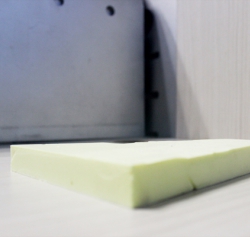- 辨别保温材料好坏的方法
越来越多的人开始注重保温材料的导热系数及吸水率。然而,如何选择一种保温材料,导热系数高吸水率好就真的是好的保温材料吗?究竟保温材料如何辨别好坏?
很多人在选择保温材料作为外保温主材时仅凭导热系数或吸水率的高低作为评价依据,而实际上导热系数是衡量保温材料的保温性能的一项指标,并且也是选择保温材料的重要参考项,但衡量保温材料好坏的指标并非只是导热系数这一项就能够决定的,一定要参考以下几项指标综合判断:
1、吸水率:建筑保温是为建筑穿上一件棉袄,这件棉袄除了要保温外,还不能吸水。
2、透气性:透气性这项技术指标是指水汽扩散阻力。如果外墙外保温系统透气性不好,水气扩散受阻,一是阻碍墙体向外排湿,影响饰面涂料的颜色;二是产生应力,使涂膜鼓泡,脱落;三是导致墙身含湿量逐步增加,产生冷凝水富集,从而给墙体热工、结构等性能带来不利影响,四是即使外墙外保温系统节能达标了,但却造成室内空气浑浊,不适合人居。
3、粘结强度:反映判断墙体保温材料的粘结牢固程度,为减少和避免墙体保温系统的空鼓.开裂和脱落现象,确保安全耐久性的使用功能。
4、抗拉强度:保温板要满足一定的抗拉强度或撕裂强度。
5、抗压强度
6、防火性能:防火性能会有相应的材料的防火性能级别,
7、环保性
8、使用寿命

More and more people begin to pay attention to the thermal conductivity and water absorption of thermal insulation materials. However, how to choose a thermal insulation material, thermal conductivity high water absorption is really a good thermal insulation material? How to distinguish good insulation material after all? Many people only use the thermal conductivity or water absorption rate as the evaluation basis when they choose the thermal insulation material as the external thermal insulation main material, but in fact the thermal conductivity is an index to measure the thermal insulation performance of the thermal insulation material, and it is also an important reference for the selection of thermal insulation materials, but the index for measuring the quality of thermal insulation materials is not only determined by the thermal conductivity alone, must refer to the following indicators comprehensive judgment: 1, Water Absorption Rate: building insulation is for the building put on a cotton-padded jacket, this cotton-padded jacket in addition to insulation, but also can not absorb water. 2. Air PERMEABILITY: This technical term refers to the resistance to water vapor diffusion. If the external wall insulation system is not good ventilation, water vapor diffusion blocked, one is to prevent the wall from draining moisture out, affecting the color of the coating; two is to create stress, causing the coating film to bubble and fall off; three is to cause the wall moisture content to gradually increase, condensate water enrichment, thus to the wall thermal, structure and other performance of the negative impact, four is even if the external wall insulation system energy-saving standards, but it causes indoor air turbidity, not suitable for human habitation. 3. Bond Strength: to reduce and avoid the hollowing of wall insulation system, the bond strength of wall insulation material is judged. Cracking and shedding phenomena ensure safe and durable use of the function. 4, tensile strength: Insulation Board to meet a certain tensile strength or tear strength. 5, compressive strength 6, fire performance: Fire performance will have the corresponding material fire performance level, 7, environmental protection 8, service life
